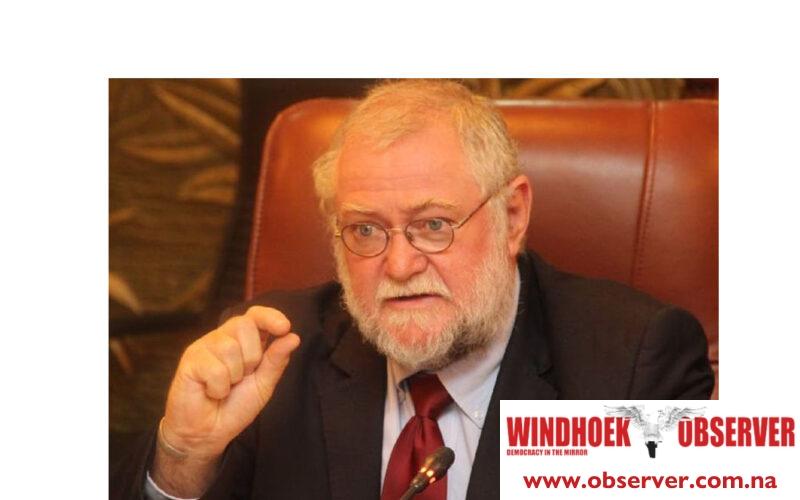Martin Endjala
The Otjombinde Constituency councillor in the Omaheke region, Wenzel Kavaka, has expressed disappointment following the early departure of the Minister of Agriculture, Water, and Land Reform, Calle Schlettwein, during a high-level meeting on the possible impact of uranium mining on the Stampriet aquifer.
Schlettwein’s departure from a meeting on Monday at Lapa Lange Lodge in the Hardap region has disappointed him.
Various stakeholders attended the event to discuss and debate the impact of uranium mining in the Stampriet transboundary aquifer system. He addressed the meeting and left shortly after.
“The minister left without even asking to be excused by us. It is very disrespectful of him to do that, and we had questions regarding his statement,” said the councillor.
Kavaka argued that the minister invited UNESCO officials to the high-level meeting to discuss the impact of uranium mining in the Stampriet aquifer instead of the International Atomic Energy Agency officials
He described this move as disappointing, as he believes that having an atomic board that is well-versed in the subject matter would have provided them with more insight.
Another matter he argued was the environmental assessment conducted on the Stampriet aquifer by the Environmental Commission.
Kavaka said they were unaware of such an assessment because it was not communicated and wanted to ask the minister these unanswered questions.
He added that a meeting of this nature is vital for both the community affected by the matter and Namibia at large.
He said it needs to be treated with care, or concerns will continue to prevail, hence the need to iron out any ambiguous information.
Jona Musheko, the ministry’s spokesperson, said the minister had to urgently rush back to prepare for a cabinet meeting to be held on Tuesday.
The ministry’s executive director, Ndiyakupi Nghituwamata, stated that there has been significant interest in uranium exploration in this basin.
The Stampriet Artesian Basin (SAB) on the Namibian side has so far granted Exclusive Prospecting Licenses (EPLs) and Environmental Clearance Certificates for base and rare metals, as well as nuclear fuel minerals.
Since 2012, approximately 600 exploration boreholes have been drilled under these EPLs.
She said the extensive drilling of exploration boreholes and the proposed in-situ leach mining process raise significant concerns.
Both the government and the public have expressed their concerns about the matter.
“There is a potential risk that leakage from the mining area could lead to groundwater contamination, jeopardising the health of people and animals,” she said.
The impacts of the proposed in-situ leach mining, she said, are currently unknown, as this method has never been practised in Namibia or the SADC region.
As a result, the ministry has asked UNESCO to assist in obtaining expert advice on this matter.
This includes reviewing the Environmental Impact Assessment for the Wings Project, which proposes piloting the in-situ leach methodology and providing case studies where this method has been employed.
UNESCO Regional Office for Southern Africa Head of Science, Mistartiale Zebaze Kana, said access to enough water of good quality and the preservation of water resources are core challenges for societies.
Requiring new ways of using and managing this precious resource.
“That is why, every year, we produce the World Water Development Report, a report coordinated by UNESCO on behalf of UN-Water to give visibility to this important issue,” he said.
He said the Stampriet transboundary aquifer system, a lifeline for the arid regions of Namibia, Botswana, and South Africa, is threatened by potential pollution.
In recent years, most countries in Southern Africa including Namibia, Botswana, and South Africa have experienced an increase in natural disasters, such as droughts and floods that compromise water and food security.
With the number of catastrophic events predicted to grow by 40% between 2015 and 2030, Kana said it is expected that more pressure will be applied to the current water resources, which will be affected both in terms of quantity and quality during droughts and floods.
He said its collective responsibility is to ensure that water resources continue to sustain the communities and ecosystems that depend on them.
Kana encouraged the neighbouring states in the management of transboundary basins and aquifers to encourage cooperation between countries that share aquifers, lakes, and river basins.
By creating spaces for exchange and joint decisions will ensure an equitable and sustainable use of water resources.




